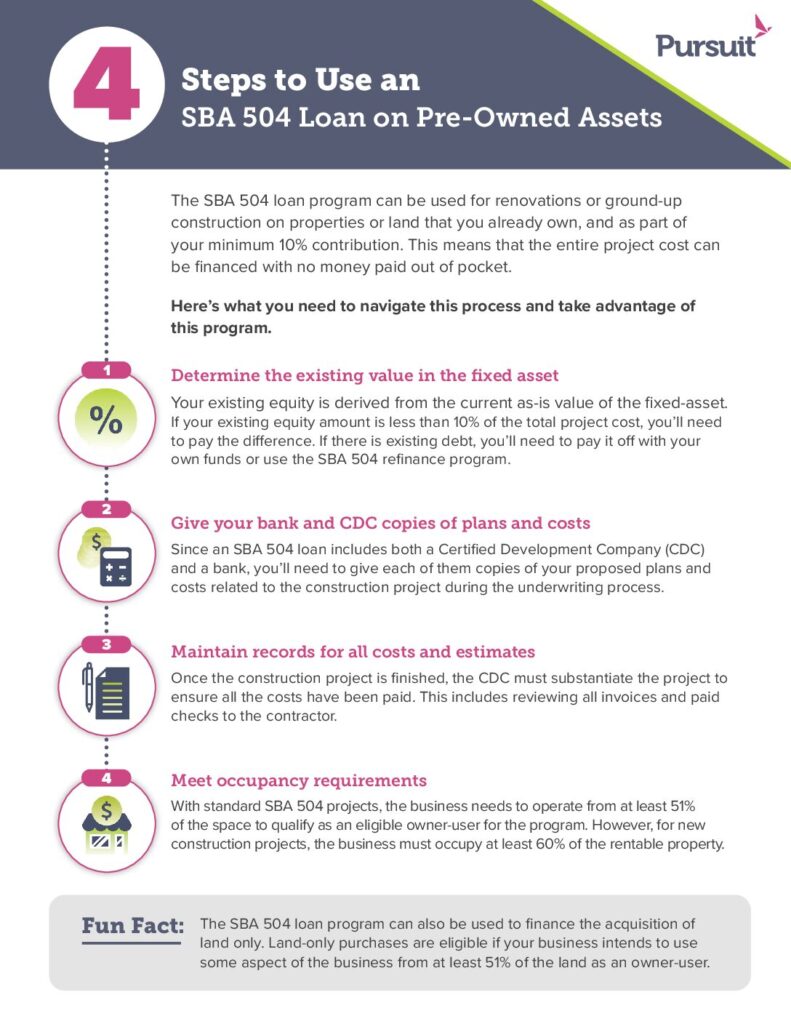The SBA 504 loan program is a popular business loan option for small business owners who want to buy existing commercial real estate for their business. But did you know it’s also great for new construction (aka, ground-up projects) or extensive renovations to existing properties?
Here’s why it’s an excellent option as a commercial construction loan, and what you should know as you consider it or start the SBA 504 loan process.
What are the benefits of using the SBA 504 loan program for a commercial construction loan?
With the SBA 504 loan program, you can qualify for a low, fixed interest-rate loan up to $5.5 million with a term up to 25 years, usually with only a 10% down payment. All of this makes it an affordable option for construction and major renovation projects.
The SBA 504 loan program is available to small businesses in many industries, including some that may be harder to finance, like restaurants, hospitality, childcare, and retail.

How to use an SBA 504 loan for construction or renovation projects
You’ll get the same benefits of the SBA 504 program no matter how you use it. However, since construction projects are more complex, there are some additional steps in the process than when you use the program to buy an existing commercial property.
- Ground-up/new construction changes the owner-occupancy requirements. With standard SBA 504 projects, you need to use 51% of the space for your business. For new construction projects, you must occupy at least 60% of the rentable property. You can permanently lease up to 20% to a third party and temporarily lease the other 20%. However, you have to use some of that temporarily leased space for your business within three years and all of it within 10 years.
- Because an SBA 504 loan includes both a Certified Development Company (CDC) and a bank, you’ll need to give the bank and CDC copies of your proposed plans and costs related to the construction project during the underwriting process. This will help determine the scope of the project and the total financing request.
- When you close on the property, the first-mortgage lender (your bank) will typically also provide a short-term construction loan. This is used to provide advances orpayments to your contractors until the construction or renovation project is complete. Once it’s finished and fully substantiated by the CDC (including the appraisal recertification), your permanent SBA 504 loan will be funded.
- When financing new construction or substantial improvements, the appraisal must estimate the “as-is” value of the property before construction, and the market value when it’s complete.
After construction is completed, the appraiser, general contractor, project architect, or construction-management firm must give the CDC a statement that the building was built with only minor deviations (if any) from the plans and specifications upon which the original estimate of value was based. - Once the renovation project is finished, the CDC must substantiate the project to ensure all the costs have been paid by reviewing all paid checks and invoices to the contractor.
If you aren’t able to substantiate the entire project, the CDC won’t be able to fund the SBA 504 loan. This is why it’s important to maintain records for all costs and estimates for your project. The CDC must also ensure that no mechanic liens exist on the property before funding. - When you use the SBA 504 loan program you’ll get your funding at closing through a debenture. Unlike traditional lenders that use their deposit accounts to raise funds for loans, CDCs raise funds to finance the SBA-guaranteed portion of an SBA 504 loan through a debenture. To keep it simple, debentures are similar to a bond. They can be bought and sold on financial markets between two different groups of investors.
Can an SBA 504 loan finance your own construction on your property?
While you can finance your own construction with an SBA 504 loan, it’s not preferred by lenders. Handling the construction on your own will also add some additional steps to the process, including:
- Demonstrating to your CDC that you have the experience needed, and the appropriate licenses to do the work.
- Getting two separate bids to show that the costs are the same or less than what another independent contractor would charge you for the work. If you’re going to be the general contractor for the construction, you can’t earn a profit on the project.
How to refinance your debt as part of your commercial construction loan
If you want to renovate or expand your commercial property and have a mortgage on it, you can use the SBA 504 program to refinance the debt and roll in your construction costs as part of the new mortgage. This is called a debt refinance with expansion.
The debt you’re refinancing can’t exceed 100% of the cost of the expansion. For example, if you have a $1,000,000 expansion project, you can only refinance up to $1,000,000 in qualified debt.
With any renovation or expansion project (including those with a debt refinance component), the SBA will allow you to use your equity in the land or building for your contribution to the loan. This could reduce your out-of-pocket expenses for your renovation project.
Take the leap to grow your business with an SBA 504 loan
While these additional steps may seem overwhelming, knowing them in advance can save you time and stress as your project moves forward. Plus, when you work with an experienced CDC, like Pursuit, we’ll be with you through every step of the process.
For example, take Liberty Pole Spirits. With their whiskey growing in popularity, the Hough family saw that they needed to expand their operation, including their most recent project: a ground-up construction of their new distilling campus. Pursuit was there to provide them with support throughout the process. “Ryan and our Pursuit team and our bank were responsive and great to work with on our SBA 504 loan,” Jim Hough said when asked about the process. Despite the complexity of the project, with Pursuit’s assistance, the Houghs were able to complete the project successfully and keep their business on the path to growth.
Pursuit can help you get the SBA 504 funding you need
If you’re exploring commercial construction loan options for a project, or if you just want to learn more about the SBA 504 loan program, Pursuit can help.
Every day, we help small business owners find the funding they need to launch and grow their businesses, including creating the commercial properties of their dreams, and we can help you, too Let’s work together to find the funding you need to reach your goals.
Apply today to get started!

